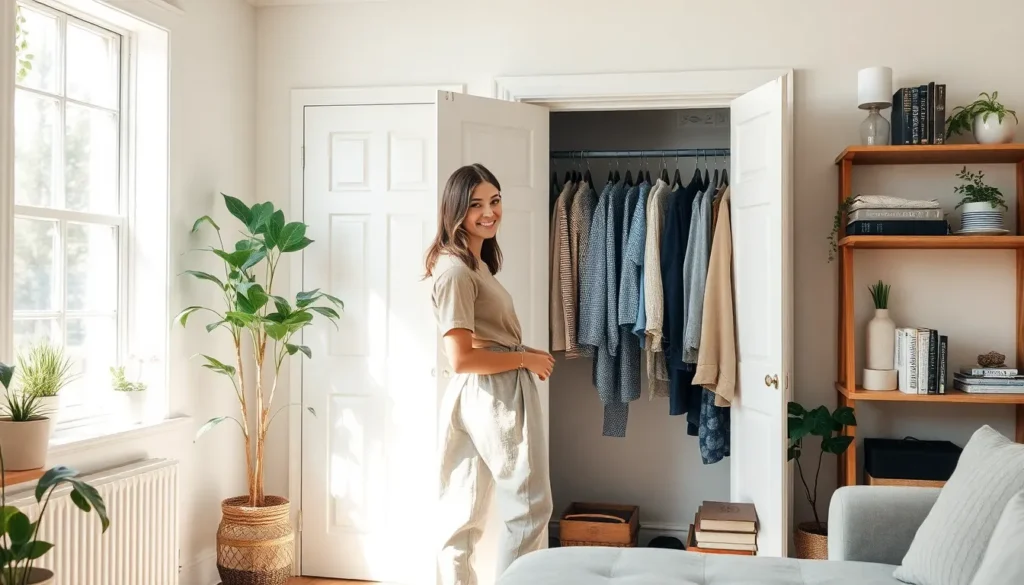In a world buzzing with constant noise and endless to-do lists, simple living offers a refreshing escape. Imagine trading in the chaos of daily life for a more intentional, minimalist approach. It’s not about giving up your favorite things; it’s about finding joy in what truly matters. Who knew that decluttering your closet could lead to a clearer mind and a happier heart?
Table of Contents
ToggleWhat Is Simple Living?
Simple living focuses on minimizing distractions to enhance life enjoyment. It’s about prioritizing essential belongings and experiences to live intentionally.
Key Principles of Simple Living
Clarity defines simple living. Individuals prioritize quality over quantity, choosing to keep items that bring joy and usefulness. Minimalism plays a vital role, encouraging people to declutter their environments and streamline possessions. Intentionality drives decisions, fostering a mindset where choices reflect personal values. Embracing sustainability also contributes, with many opting for eco-friendly products and practices that reduce waste.
Benefits of Embracing Simplicity
Mental clarity emerges as a primary benefit. By decluttering, individuals often experience reduced stress and increased focus. Enhanced happiness follows as people reconnect with what truly matters in life. Financial freedom can result from minimalism, as spending on unnecessary items decreases. Relationships improve with increased quality time, cultivated in an intentional setting. Overall, adopting a simpler lifestyle fosters a deeper sense of fulfillment and purpose.
How to Start Your Simple Living Journey

Embracing simple living requires actionable steps. Start with decluttering and practicing mindful consumption to create a more intentional lifestyle.
Decluttering Your Space
Decluttering your space promotes mental clarity. Begin by tackling one area at a time, such as a closet or a drawer. Removing items that no longer serve a purpose leads to a more organized environment. The KonMari method encourages keeping only those possessions that spark joy, fostering a sense of happiness. A clear space often results in a clearer mind, enhancing overall well-being. Regularly revisiting and reassessing belongings can help maintain simplicity.
Mindful Consumption
Mindful consumption emphasizes intentional purchasing decisions. Focus on quality over quantity when acquiring new items. Supporting sustainable brands contributes to less waste and positively impacts the environment. Before making a purchase, ask if it’s truly necessary or beneficial. This practice not only helps reduce clutter but also promotes financial freedom. Engaging in mindful experiences, such as travel or hobbies, can enrich life without adding physical possessions. Ultimately, fostering a mindset of intention and awareness leads to more fulfilling choices.
Simple Living Practices
Simple living practices enhance overall well-being and promote intentionality in daily life. Individuals can adopt various methods to simplify their routines and foster a more fulfilling existence.
Minimalism in Daily Life
Minimalism encourages individuals to assess their possessions and prioritize what’s essential. Clear spaces lead to clear minds; therefore, organizing living areas helps reduce distractions. Individuals focus on quality over quantity, selecting items that truly add value. They can simplify daily routines by eliminating unnecessary tasks, allowing for a more mindful approach to time management. Engaging in minimalist practices can also create space for hobbies and activities that bring joy. Each action taken towards minimalism fosters a deeper connection with the present moment.
Sustainable Living Choices
Sustainable living choices reflect intentional purchasing and commitment to the environment. Opting for eco-friendly products not only reduces waste but also supports responsible companies. Individuals can choose locally sourced foods, which benefit both health and local economies. Choosing to reduce plastic use and recycle materials demonstrates a commitment to sustainability. They may also explore alternative energy sources such as solar power, which lessen reliance on nonrenewable resources. Each sustainable decision contributes to a healthier planet and encourages a lifestyle that values sustainability over consumerism.
Challenges of Simple Living
Adopting a simple living lifestyle presents unique challenges that individuals must navigate. Focusing on key difficulties enhances understanding and provides clarity in overcoming these obstacles.
Overcoming Materialism
Materialism often poses a significant barrier to simple living. People frequently find it tough to detach from possessions tied to identity or status. To tackle this, individuals can start by reassessing the true value of their belongings. Recognizing that happiness doesn’t stem from material goods can lead to greater appreciation for experiences and relationships. Embracing a mindset shift encourages prioritizing fulfillment beyond physical items. This transition often requires time and patience.
Managing Expectations
Managing expectations plays a crucial role in the simple living journey. Individuals might anticipate immediate benefits, but significant changes take time. Adjusting to a simpler lifestyle can involve discomfort as people let go of cherished items and re-evaluate daily habits. Accepting that gradual progress is essential helps maintain motivation. Setting realistic goals allows individuals to celebrate small victories while staying focused on the overall objective of enhanced well-being through simplicity. Balancing ambition with patience fosters a more sustainable approach to living intentionally.
Embracing simple living offers a pathway to a more fulfilling life. By prioritizing what truly matters and minimizing distractions, individuals can cultivate mental clarity and happiness. The journey towards simplicity is not just about decluttering physical spaces but also about fostering meaningful connections and experiences.
As one navigates this lifestyle shift, it’s essential to remain patient and celebrate progress. By making intentional choices and committing to sustainable practices, anyone can enhance their well-being and contribute positively to the environment. Ultimately, simple living empowers individuals to reclaim their time and joy, leading to a richer and more purposeful existence.





